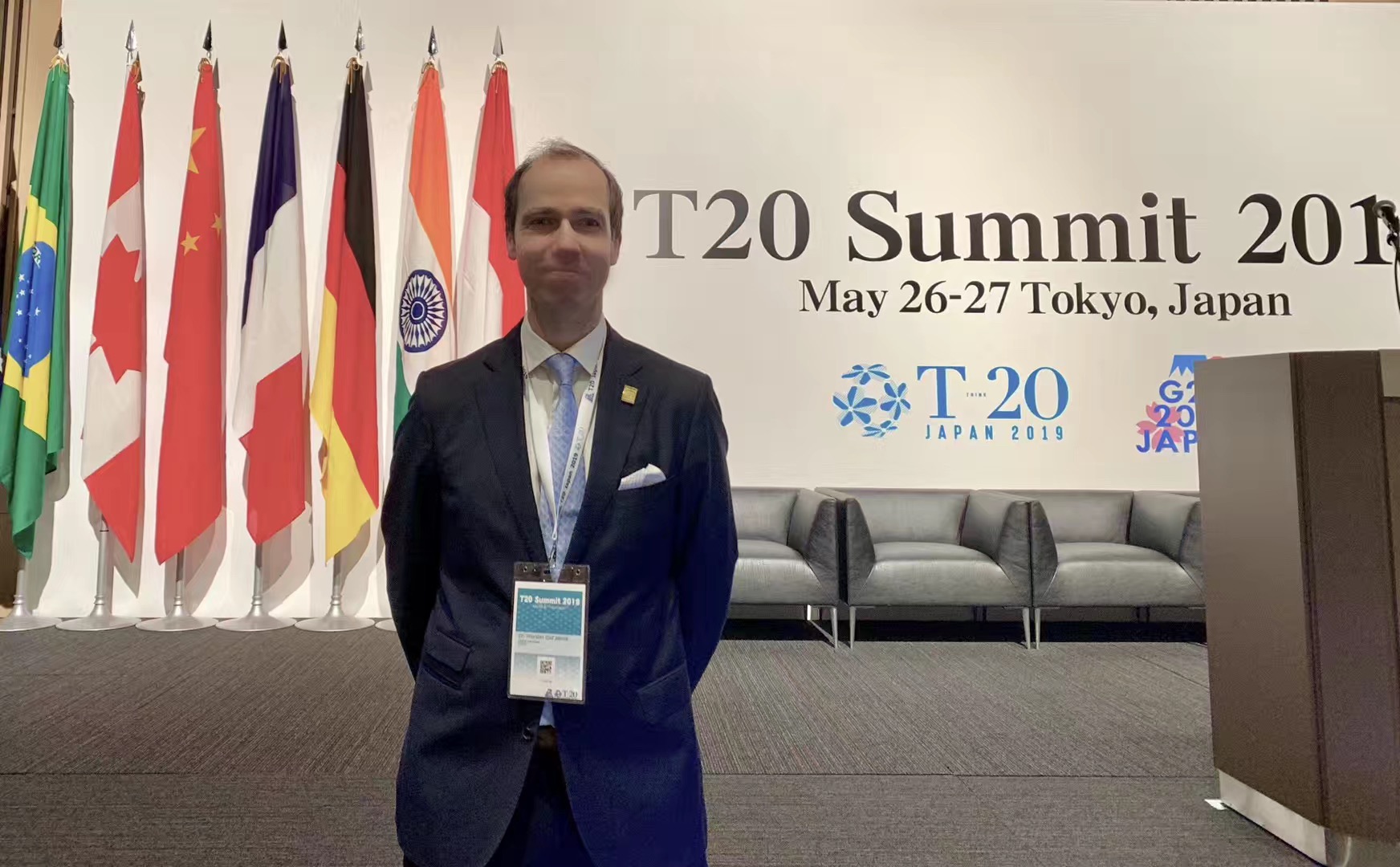
Leading think tanks and experts from around the world met at the Think 20 (T20) Japan Summit in Tokyo from 26th-27th May 2019. As part of the G20 group of 37 countries and international organizations, which is gathering in Osaka from 27th-30th June, the T20 provides the G20 group policy recommendations and addresses pressing regional and global challenges and trends. In the past, the Taihe Institute contributed to the discussions on the occasions of the G20 and T20 in Hangzhou (2016) and Argentina (2018). This year, the Taihe Institute focused on three areas: digitalization, infrastructure, and global governance.
Carrying forward many of the global challenges discussed during the T20 summit in Argentina last year, this year’s T20 Summit was focused on ways to promote a “sustainable, inclusive and resilient society.” Inequality, poverty, sustainability, trade, digital innovation, aging population, migration, infrastructure, and the realization of the United Nations Sustainable Development Goals (SDGs) were at the center of the discussions, and 10 task forces had addressed them throughout the entire year.
In the wake of the mounting global challenges and the increasing impact of digital innovation, the question of effective and robust global governance received particular attention. The focus was therefore not only on what needs to be done but also on how it should be done to overcome existing roadblocks and bring back stability and certainty. The participants had no doubt that only through international governance and multilateralism could the challenges of our time still be addressed most effectively and for the purpose of the greater good and that the existing multilateral system urgently needs reformation.
After years of hyperglobalization, no individual country can resolve today’s challenges alone simply because every nation-state faces the conflicting forces of globalization, national sovereignty, and social cohesion, as Dani Rodrik already pointed out almost a decade ago. No single economy can address all those dimensions simultaneously. Focusing on one will comprise the others. Countries are embedded in global trade but bound to national or regional laws and jurisdictions. More recently, rapid technological advancement – in areas such as 5G, the Internet of things, artificial intelligence, and robotics – has provided new growth opportunities and can lead to realization of the SDGs, but they are also prone to intensifying inequality, unemployment, and populism. Likewise, climate action could be a source of innovation and growth with the right set of incentives, such as a global carbon tax, but political and economic interests and existing supply chains turn climate action into a conflicting goal that undermines the prospects of a circular economy.
Existing multilateral institutions, especially the WTO and its predecessor, the GATT, were in the center of the discussions. In 1995, the WTO was founded to boost the global economy and guarantee the free flow of capital and goods. The WTO has tremendously accelerated global growth due to the integration of late-emerging economies into the global markets. Not least due to China’s economic reforms since 1978 and its WTO accession in 2001, hundreds of millions of people were lifted out of absolute poverty—850 million people in China alone.
Despite such unparalleled achievement, the WTO has also perpetuated a system of globalization that has advanced inequality, climate change, protectionism, and populism. The “golden straitjacket” of the free flow of capital and goods subordinated national socioeconomic regulations to a global technocratic agenda, weakened national sovereignty, and undermined social cohesion. To benefit more from free trade between specific countries, overcome trade differences, and mitigate the WTO’s increasing impotence, the main economic blocs have advocated bilateral or international free trade agreements (FTA). New FTAs have been promoted, especially by the United States under the Obama administrations, not only to better participate in the rise of Asia and the global South but also to contain the rise of China. Both the United States and China currently maintain 20 and 16 FTAs respectively. However, from the perspective of the existing multilateral system, FTAs have contributed to the erosion of the WTO agreement.
As a result, today, the WTO is largely undermined by protectionism and nationalism, which has slowed globalization. Global foreign direct investments contracted to 19% in 2018, down from 23% in 2017, and the global trade volume growth is forecasted to fall from 3.0% in 2018 to 2.6% in 2019. This downward trend has reinforced the unilateral action the United States and the Trump administration have taken as they impose or threaten to impose tariffs on its allies, direct neighbors, and China in particular. Unsurprisingly, the T20 discussions were overshadowed by the United States’ ongoing trade war with China. The WTO only has a chance for survival and revival if both sides find a way out of the trade war and collaboratively work on reforming the WTO’s principles and procedures. Given the vast amount of challenges and disruptions the existing system of globalization has caused, the WTO cannot simply revert to the assumptions and principles that led to its formation in 1995.
The failure to reform the WTO and a multilateral system that promotes global trade and the implementation of the SDGs will lead to an economic-power-based regime that will threaten growth, prosperity, sustainability, and peace. Smaller countries would especially suffer under such an asymmetric trade regime, which would be a reversion to the GATT era. Unfortunately, for now, it seems that the United States and Europe are having a hard time adjusting to the rise of China and its systemic differences. The decoupling of the US and Chinese economy has already started due to the United States’ unilateralist and protectionist approach. Soon, as the largest economy in the world, China will need to take more responsibility and better predict its domestic and foreign policies’ consequences, but it is right not to adapt a multilateral system that has proven its lack of sustainability and insufficiently safeguarded the development interests of developing members.
—————————————————————
FOCUS ON CONTEMPORARY NEEDS.
Should you have any questions, please contact us at public@taiheglobal.org